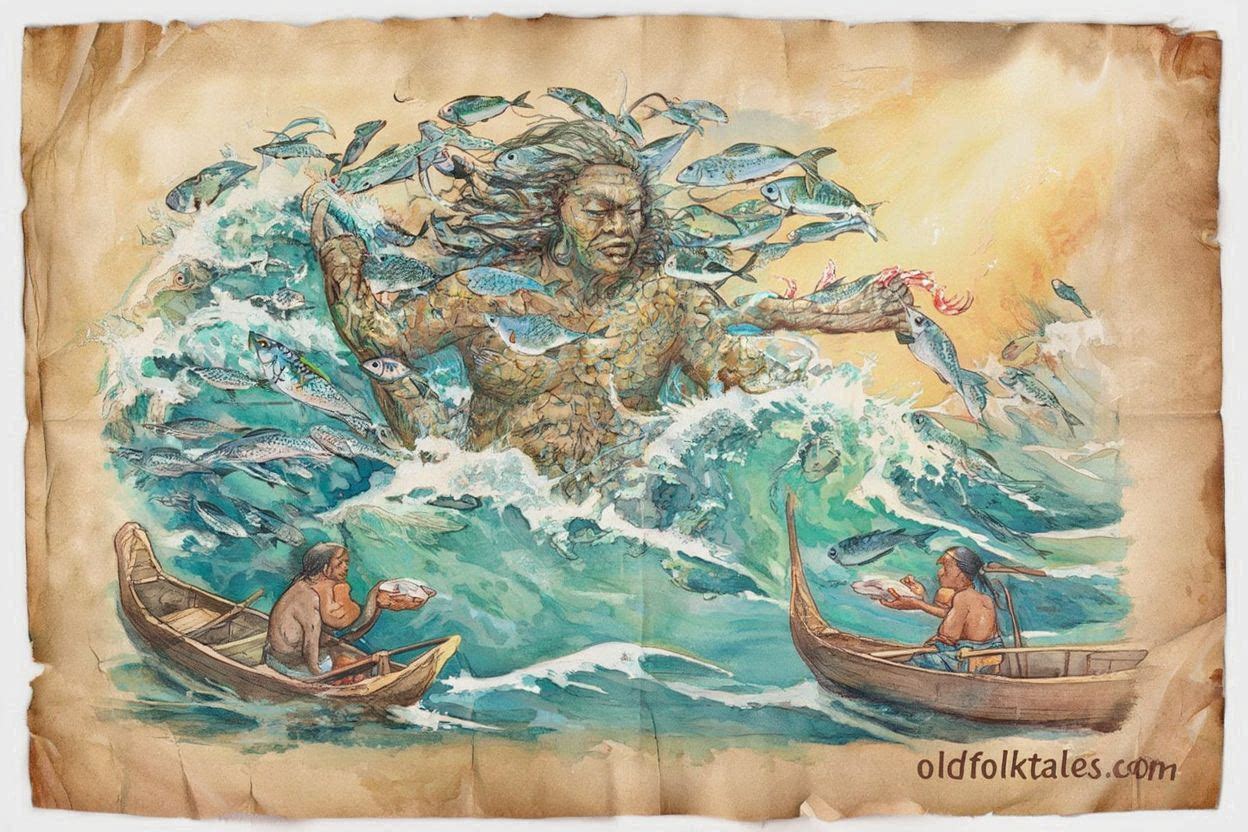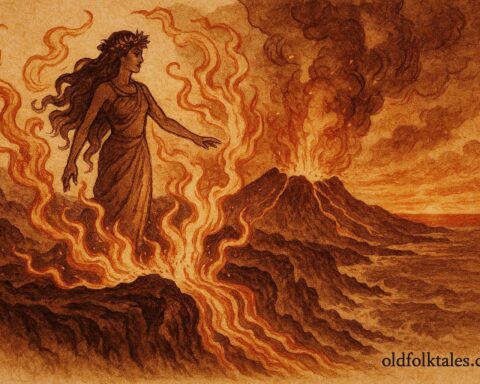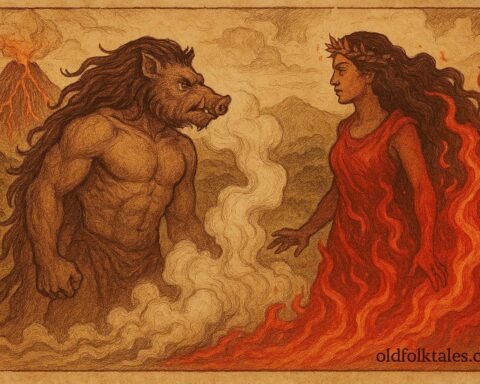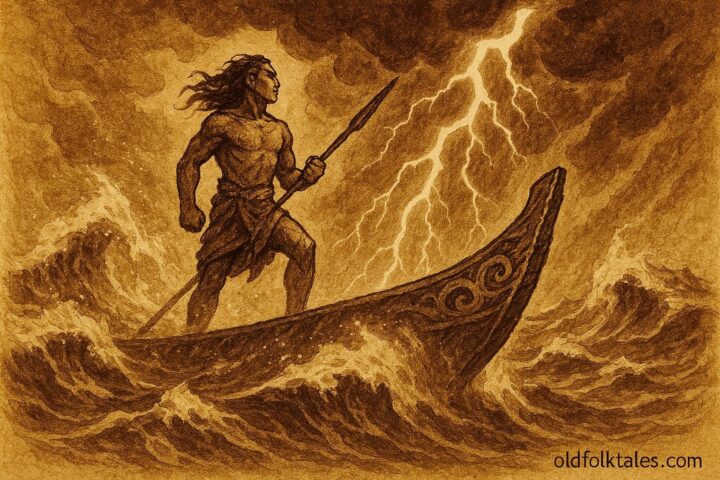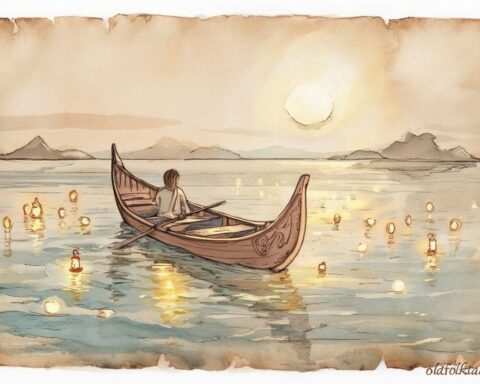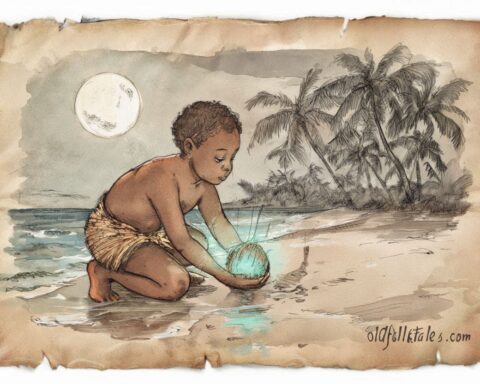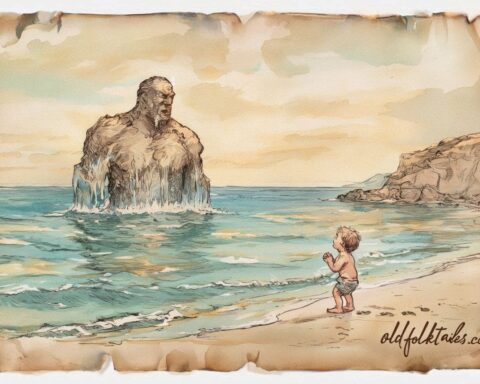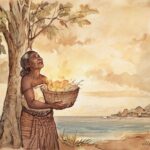Long before the islands of Palau were shaped into their present beauty, when the coral reefs still whispered to the wind and the ocean stretched endlessly, there ruled a god named Ngesechel. He was lord of the sea, guardian of its creatures, and protector of those who journeyed upon his waters. His voice was the sound of waves breaking on the reef, and his breath was the ocean breeze that carried both life and warning.
The people of Palau lived in harmony with the sea. Every morning, fishermen paddled their canoes beyond the reef, trusting the rhythm of the tides and the mercy of Ngesechel. Before casting their nets, they whispered prayers and laid small offerings upon the water, a carved shell, a few grains of taro, or drops of coconut oil, gifts of respect for the god who ruled beneath the waves.
Ngesechel was pleased when the people remembered him. He watched from his palace deep below, surrounded by schools of silver fish and glowing corals that shimmered like stars. When the fishermen prayed with sincerity, he calmed the seas and sent fish in abundance to fill their nets. But when the people grew proud and forgot their rituals, Ngesechel’s mood darkened like the gathering clouds before a storm.
One season, as the winds shifted and the rains grew scarce, the people became restless. The younger fishermen, strong and ambitious, mocked the old customs. “Why should we waste time feeding the sea?” one said. “We are skilled enough to catch our fill without prayers to a spirit we cannot see.”
Their leader, an elder named Rruel, warned them. “Ngesechel’s eyes are in every wave. His patience is deep, but his anger is deeper still. Do not forget the one who guards the sea.”
The young men laughed and sailed without making offerings. They cast their nets far and wide, catching many fish at first. But as the days passed, the winds grew fierce. The waves rose high, and a strange silence filled the sky before each storm. Then, one night, the sea erupted in fury.
Lightning struck the horizon, and thunder rolled like the roar of an ancient beast. The fishermen’s canoes were tossed like dry leaves. The water churned, and beneath it, they glimpsed something vast, the shimmering eyes of Ngesechel, burning like twin moons. His voice echoed through the storm.
“You have taken from my waters and offered nothing in return. You have forgotten the respect that binds sea and land. For your pride, I send this storm to remind you that all things flow from balance.”
The fishermen tried to cry out for mercy, but their voices were lost in the wind. Their nets tore apart, and many were thrown into the depths. Only Rruel, the elder who had warned them, remained calm. He stood in his canoe, raised his hands, and called to the god.
“Ngesechel, forgive the folly of our hearts. The sea feeds us, and we are bound to it. Accept this prayer and our return to gratitude.”
He took his last fish, his only catch and placed it upon the water as an offering. The sea swallowed it whole. The storm paused, and the waves slowly began to calm. Ngesechel’s voice returned, softer now, like the rustle of the tide against sand.
“Rruel, your words restore the balance. Let your people remember this lesson. Let them teach the children that the sea is not theirs to command, but to honor.”
By morning, the ocean lay still, shining as if it had never been touched by anger. The surviving fishermen returned home, humbled and silent. They built a shrine upon the beach to honor Ngesechel and made offerings every dawn before sailing.
From that time onward, the people of Palau remembered that the sea was alive, a realm of spirits, both merciful and just. When they fished, they prayed. When they feasted, they gave thanks. And whenever storms gathered on the horizon, they knew it was Ngesechel watching, reminding them to live in gratitude and balance.
Even today, fishermen speak his name before entering the water, tracing a small circle in the air with their hands. They say it pleases the god and keeps the sea calm. For in Palau, Ngesechel is not merely a deity of the ocean but the living spirit of respect between humans and nature, a covenant that endures as long as the waves meet the shore.
Moral Lesson
The story of Ngesechel teaches that nature is sacred and must be treated with reverence. When people forget gratitude and balance, harmony is lost. Respecting the sea and the unseen forces that sustain life ensures peace, safety, and abundance for all.
Knowledge Check
1. Who is Ngesechel in Palauan mythology?
Ngesechel is the sea god who rules over the waters and protects those who fish and travel upon them.
2. What did the fishermen offer to Ngesechel before each voyage?
They offered small gifts such as shells, taro, or coconut oil to show respect.
3. Why did Ngesechel become angry?
He became angry because the fishermen grew proud and stopped making offerings to him.
4. What happened when Ngesechel’s anger rose?
He sent violent storms that destroyed the fishermen’s nets and canoes.
5. How did Rruel calm the sea god’s anger?
He offered his only fish to Ngesechel and prayed for forgiveness, restoring balance.
6. What is the main lesson of the story?
That gratitude and respect for nature maintain harmony and protect life.
Source: Adapted from Palauan Myths and Ocean Deities by the Palau Bureau of Arts and Culture (2012).
Cultural Origin: Palauan (Palau, Micronesia)
